Fair Value Accounting: Evaluating Issues in Financial Reporting
VerifiedAdded on 2022/08/19
|12
|2922
|12
Report
AI Summary
This report critically evaluates the issues associated with fair value accounting. It begins by defining fair value accounting and its role in financial statements. The report identifies five key arguments related to fair value accounting, including its impact on earnings information, increased inherent risks, potential for lower asset valuations, implications for earnings per share, and the influence of human factors. The analysis draws on recent articles to support these arguments, exploring topics such as the impact of globalization on fair value accounting, audit challenges in fair value measurements, the adoption of fair value accounting during the global financial crisis in Korea, the effect of fair value accounting on performance evaluation, and the reliability of fair value estimates for financial decision-making. The report concludes by emphasizing the continuous evolution of fair value accounting and the need for appropriate application to ensure accurate and reliable financial reporting. It highlights the importance of transparency and efficient earnings reporting to mitigate potential issues.
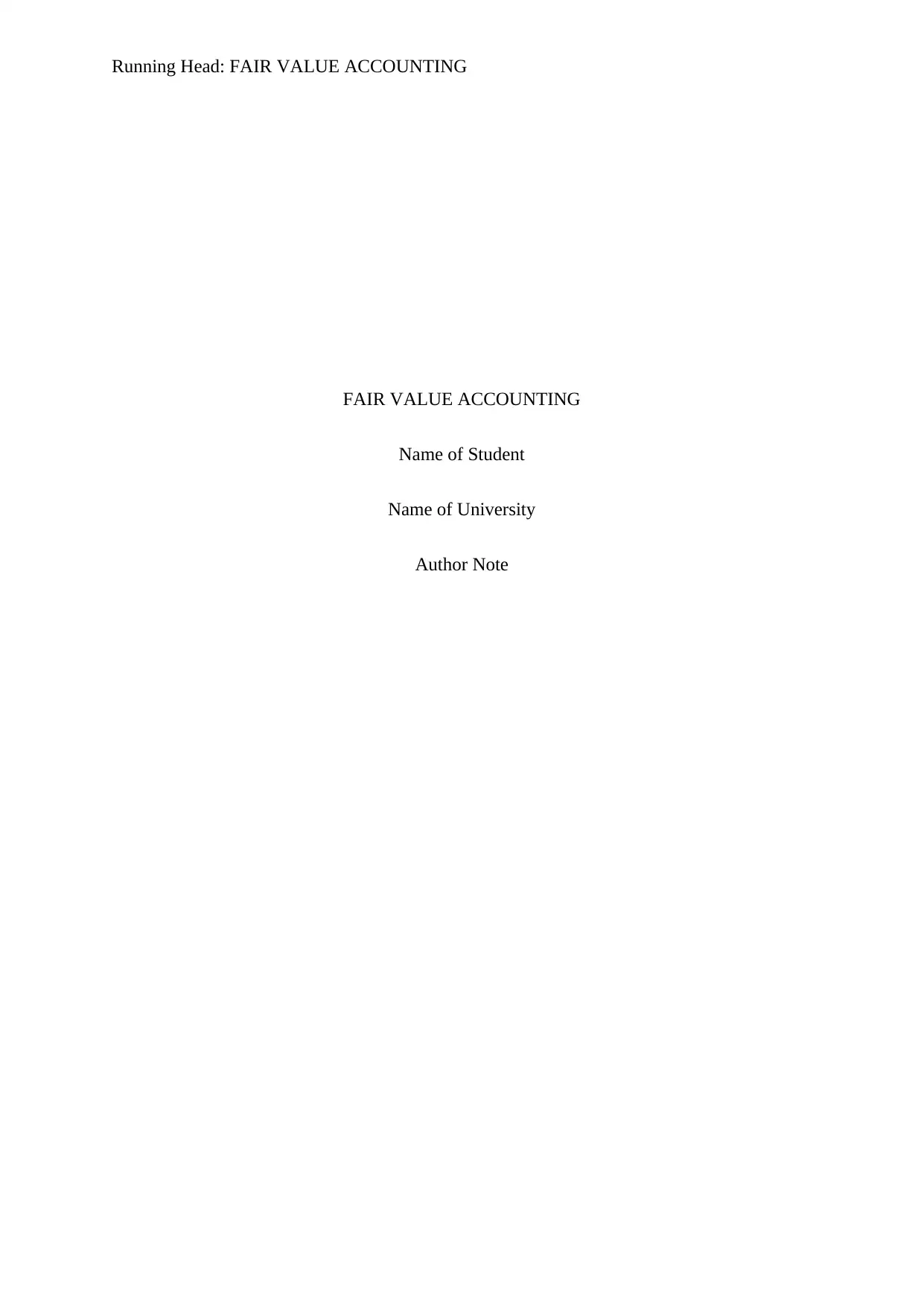
Running Head: FAIR VALUE ACCOUNTING
FAIR VALUE ACCOUNTING
Name of Student
Name of University
Author Note
FAIR VALUE ACCOUNTING
Name of Student
Name of University
Author Note
Paraphrase This Document
Need a fresh take? Get an instant paraphrase of this document with our AI Paraphraser
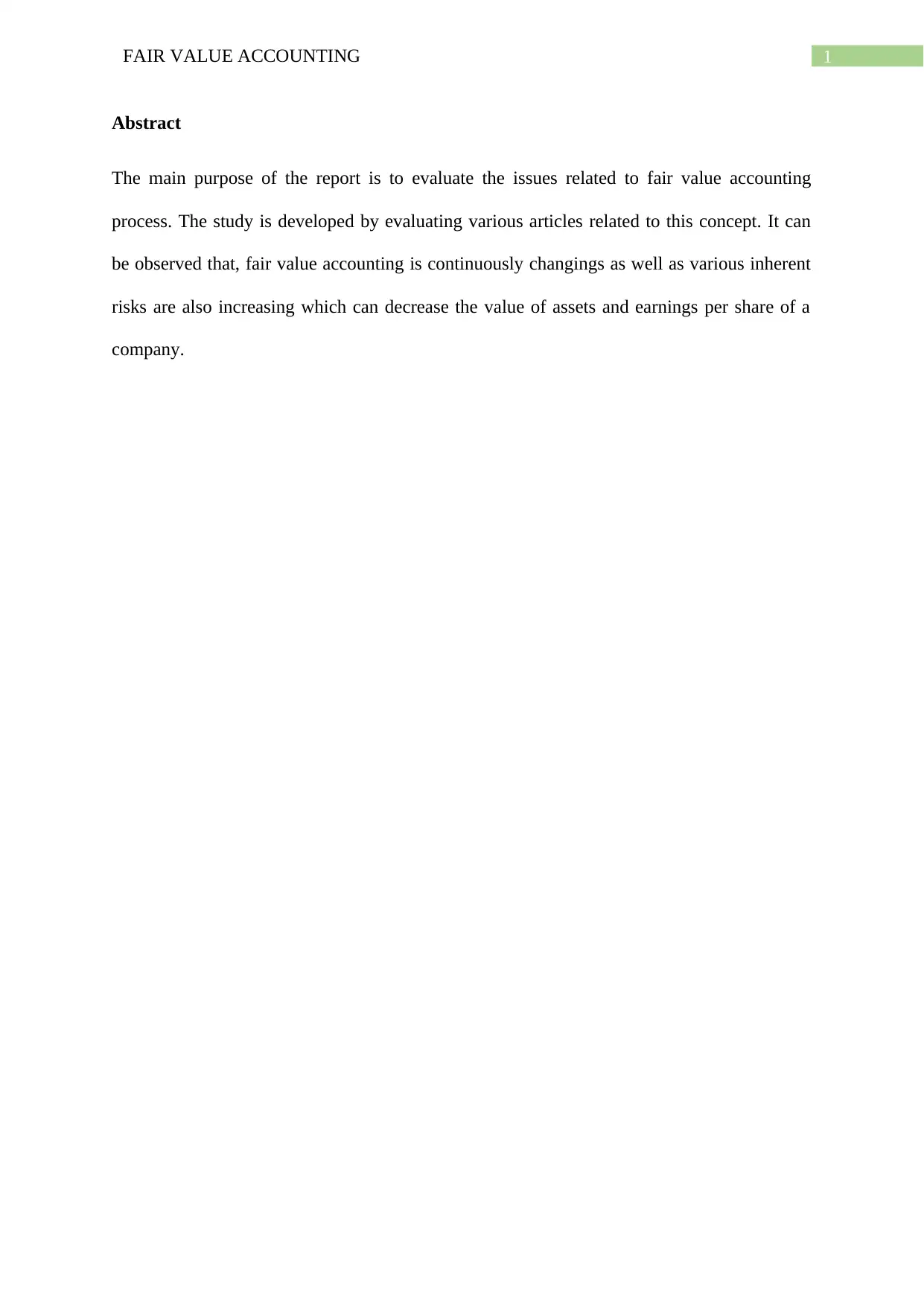
1FAIR VALUE ACCOUNTING
Abstract
The main purpose of the report is to evaluate the issues related to fair value accounting
process. The study is developed by evaluating various articles related to this concept. It can
be observed that, fair value accounting is continuously changings as well as various inherent
risks are also increasing which can decrease the value of assets and earnings per share of a
company.
Abstract
The main purpose of the report is to evaluate the issues related to fair value accounting
process. The study is developed by evaluating various articles related to this concept. It can
be observed that, fair value accounting is continuously changings as well as various inherent
risks are also increasing which can decrease the value of assets and earnings per share of a
company.
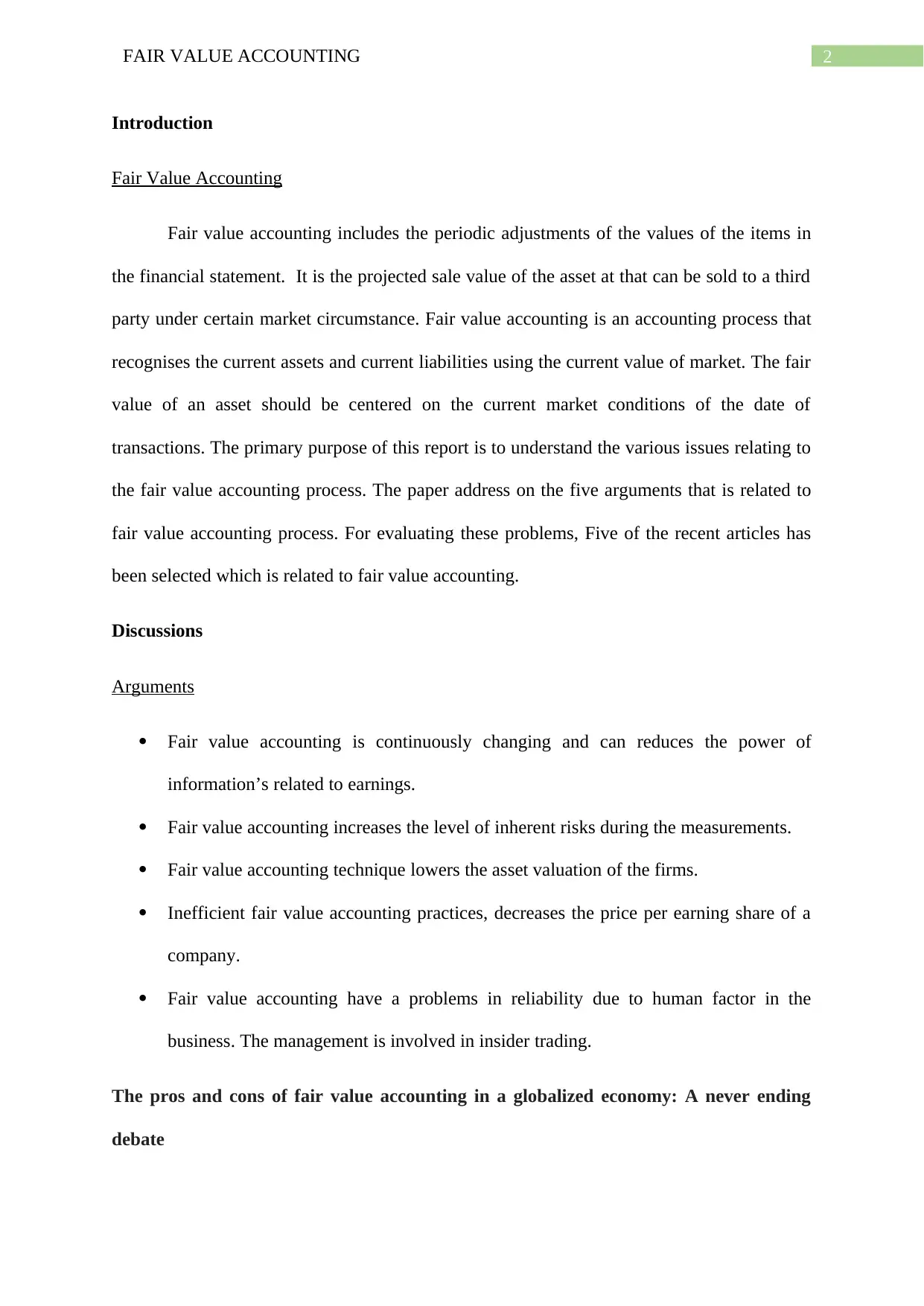
2FAIR VALUE ACCOUNTING
Introduction
Fair Value Accounting
Fair value accounting includes the periodic adjustments of the values of the items in
the financial statement. It is the projected sale value of the asset at that can be sold to a third
party under certain market circumstance. Fair value accounting is an accounting process that
recognises the current assets and current liabilities using the current value of market. The fair
value of an asset should be centered on the current market conditions of the date of
transactions. The primary purpose of this report is to understand the various issues relating to
the fair value accounting process. The paper address on the five arguments that is related to
fair value accounting process. For evaluating these problems, Five of the recent articles has
been selected which is related to fair value accounting.
Discussions
Arguments
Fair value accounting is continuously changing and can reduces the power of
information’s related to earnings.
Fair value accounting increases the level of inherent risks during the measurements.
Fair value accounting technique lowers the asset valuation of the firms.
Inefficient fair value accounting practices, decreases the price per earning share of a
company.
Fair value accounting have a problems in reliability due to human factor in the
business. The management is involved in insider trading.
The pros and cons of fair value accounting in a globalized economy: A never ending
debate
Introduction
Fair Value Accounting
Fair value accounting includes the periodic adjustments of the values of the items in
the financial statement. It is the projected sale value of the asset at that can be sold to a third
party under certain market circumstance. Fair value accounting is an accounting process that
recognises the current assets and current liabilities using the current value of market. The fair
value of an asset should be centered on the current market conditions of the date of
transactions. The primary purpose of this report is to understand the various issues relating to
the fair value accounting process. The paper address on the five arguments that is related to
fair value accounting process. For evaluating these problems, Five of the recent articles has
been selected which is related to fair value accounting.
Discussions
Arguments
Fair value accounting is continuously changing and can reduces the power of
information’s related to earnings.
Fair value accounting increases the level of inherent risks during the measurements.
Fair value accounting technique lowers the asset valuation of the firms.
Inefficient fair value accounting practices, decreases the price per earning share of a
company.
Fair value accounting have a problems in reliability due to human factor in the
business. The management is involved in insider trading.
The pros and cons of fair value accounting in a globalized economy: A never ending
debate
⊘ This is a preview!⊘
Do you want full access?
Subscribe today to unlock all pages.

Trusted by 1+ million students worldwide
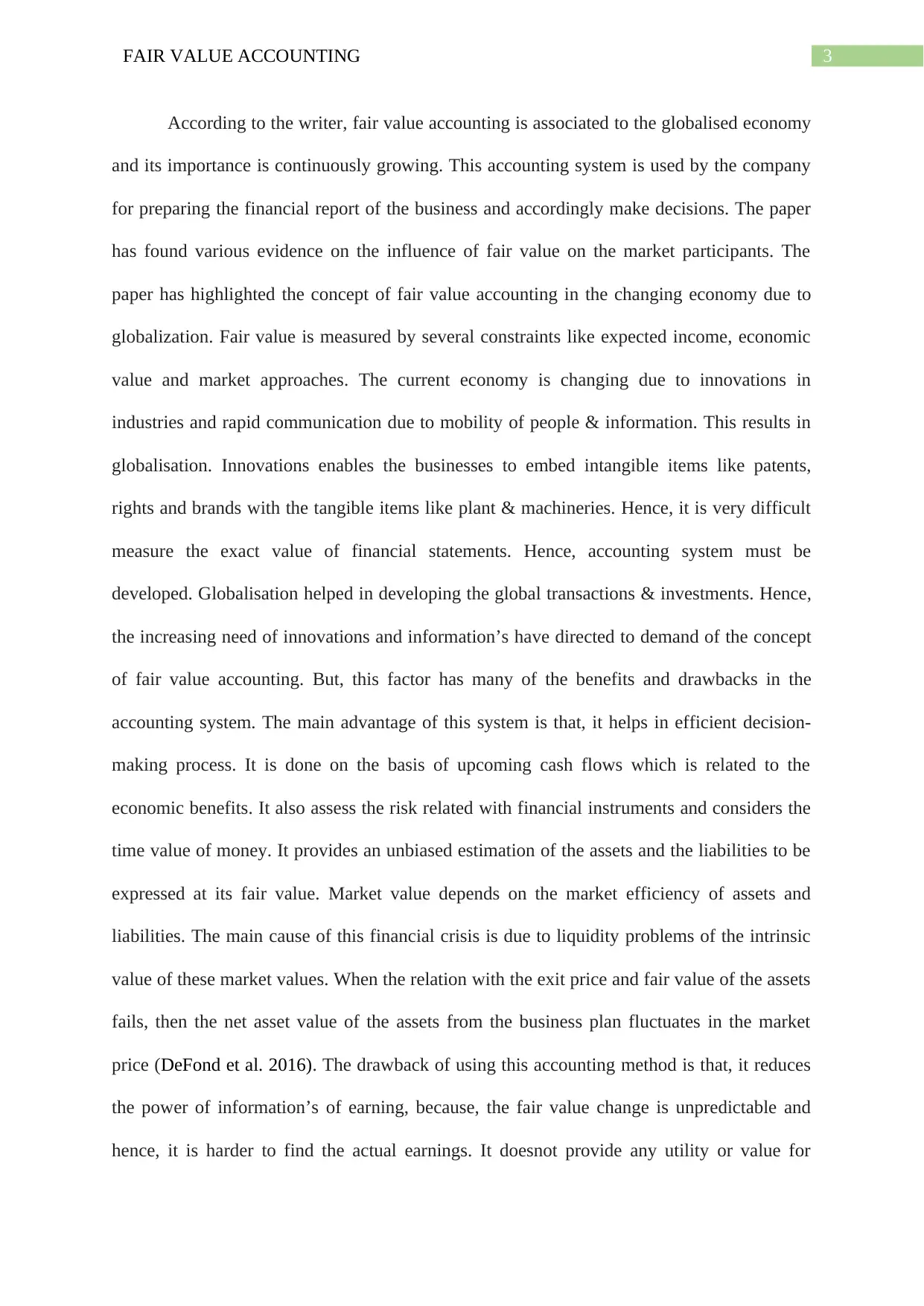
3FAIR VALUE ACCOUNTING
According to the writer, fair value accounting is associated to the globalised economy
and its importance is continuously growing. This accounting system is used by the company
for preparing the financial report of the business and accordingly make decisions. The paper
has found various evidence on the influence of fair value on the market participants. The
paper has highlighted the concept of fair value accounting in the changing economy due to
globalization. Fair value is measured by several constraints like expected income, economic
value and market approaches. The current economy is changing due to innovations in
industries and rapid communication due to mobility of people & information. This results in
globalisation. Innovations enables the businesses to embed intangible items like patents,
rights and brands with the tangible items like plant & machineries. Hence, it is very difficult
measure the exact value of financial statements. Hence, accounting system must be
developed. Globalisation helped in developing the global transactions & investments. Hence,
the increasing need of innovations and information’s have directed to demand of the concept
of fair value accounting. But, this factor has many of the benefits and drawbacks in the
accounting system. The main advantage of this system is that, it helps in efficient decision-
making process. It is done on the basis of upcoming cash flows which is related to the
economic benefits. It also assess the risk related with financial instruments and considers the
time value of money. It provides an unbiased estimation of the assets and the liabilities to be
expressed at its fair value. Market value depends on the market efficiency of assets and
liabilities. The main cause of this financial crisis is due to liquidity problems of the intrinsic
value of these market values. When the relation with the exit price and fair value of the assets
fails, then the net asset value of the assets from the business plan fluctuates in the market
price (DeFond et al. 2016). The drawback of using this accounting method is that, it reduces
the power of information’s of earning, because, the fair value change is unpredictable and
hence, it is harder to find the actual earnings. It doesnot provide any utility or value for
According to the writer, fair value accounting is associated to the globalised economy
and its importance is continuously growing. This accounting system is used by the company
for preparing the financial report of the business and accordingly make decisions. The paper
has found various evidence on the influence of fair value on the market participants. The
paper has highlighted the concept of fair value accounting in the changing economy due to
globalization. Fair value is measured by several constraints like expected income, economic
value and market approaches. The current economy is changing due to innovations in
industries and rapid communication due to mobility of people & information. This results in
globalisation. Innovations enables the businesses to embed intangible items like patents,
rights and brands with the tangible items like plant & machineries. Hence, it is very difficult
measure the exact value of financial statements. Hence, accounting system must be
developed. Globalisation helped in developing the global transactions & investments. Hence,
the increasing need of innovations and information’s have directed to demand of the concept
of fair value accounting. But, this factor has many of the benefits and drawbacks in the
accounting system. The main advantage of this system is that, it helps in efficient decision-
making process. It is done on the basis of upcoming cash flows which is related to the
economic benefits. It also assess the risk related with financial instruments and considers the
time value of money. It provides an unbiased estimation of the assets and the liabilities to be
expressed at its fair value. Market value depends on the market efficiency of assets and
liabilities. The main cause of this financial crisis is due to liquidity problems of the intrinsic
value of these market values. When the relation with the exit price and fair value of the assets
fails, then the net asset value of the assets from the business plan fluctuates in the market
price (DeFond et al. 2016). The drawback of using this accounting method is that, it reduces
the power of information’s of earning, because, the fair value change is unpredictable and
hence, it is harder to find the actual earnings. It doesnot provide any utility or value for
Paraphrase This Document
Need a fresh take? Get an instant paraphrase of this document with our AI Paraphraser
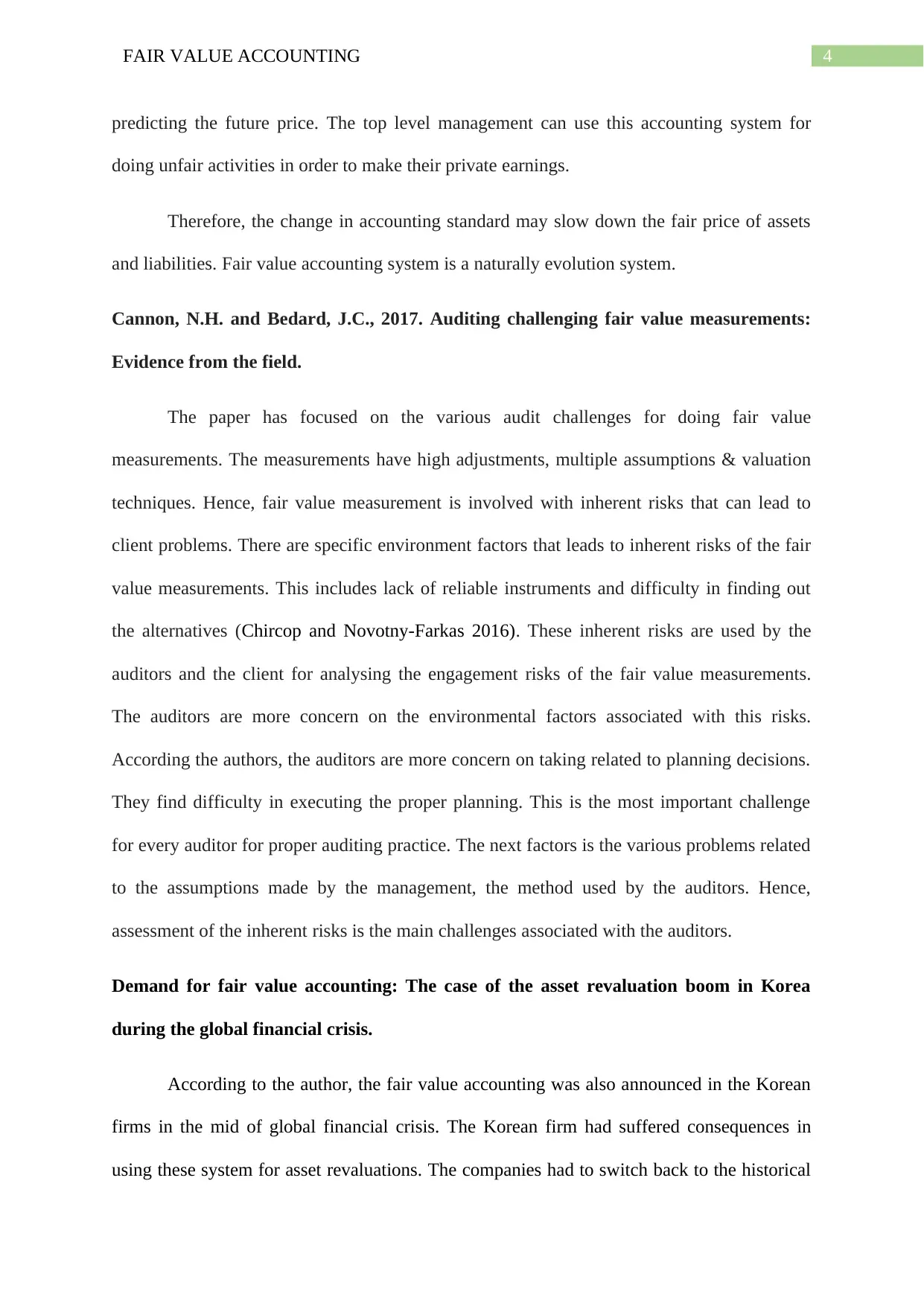
4FAIR VALUE ACCOUNTING
predicting the future price. The top level management can use this accounting system for
doing unfair activities in order to make their private earnings.
Therefore, the change in accounting standard may slow down the fair price of assets
and liabilities. Fair value accounting system is a naturally evolution system.
Cannon, N.H. and Bedard, J.C., 2017. Auditing challenging fair value measurements:
Evidence from the field.
The paper has focused on the various audit challenges for doing fair value
measurements. The measurements have high adjustments, multiple assumptions & valuation
techniques. Hence, fair value measurement is involved with inherent risks that can lead to
client problems. There are specific environment factors that leads to inherent risks of the fair
value measurements. This includes lack of reliable instruments and difficulty in finding out
the alternatives (Chircop and Novotny-Farkas 2016). These inherent risks are used by the
auditors and the client for analysing the engagement risks of the fair value measurements.
The auditors are more concern on the environmental factors associated with this risks.
According the authors, the auditors are more concern on taking related to planning decisions.
They find difficulty in executing the proper planning. This is the most important challenge
for every auditor for proper auditing practice. The next factors is the various problems related
to the assumptions made by the management, the method used by the auditors. Hence,
assessment of the inherent risks is the main challenges associated with the auditors.
Demand for fair value accounting: The case of the asset revaluation boom in Korea
during the global financial crisis.
According to the author, the fair value accounting was also announced in the Korean
firms in the mid of global financial crisis. The Korean firm had suffered consequences in
using these system for asset revaluations. The companies had to switch back to the historical
predicting the future price. The top level management can use this accounting system for
doing unfair activities in order to make their private earnings.
Therefore, the change in accounting standard may slow down the fair price of assets
and liabilities. Fair value accounting system is a naturally evolution system.
Cannon, N.H. and Bedard, J.C., 2017. Auditing challenging fair value measurements:
Evidence from the field.
The paper has focused on the various audit challenges for doing fair value
measurements. The measurements have high adjustments, multiple assumptions & valuation
techniques. Hence, fair value measurement is involved with inherent risks that can lead to
client problems. There are specific environment factors that leads to inherent risks of the fair
value measurements. This includes lack of reliable instruments and difficulty in finding out
the alternatives (Chircop and Novotny-Farkas 2016). These inherent risks are used by the
auditors and the client for analysing the engagement risks of the fair value measurements.
The auditors are more concern on the environmental factors associated with this risks.
According the authors, the auditors are more concern on taking related to planning decisions.
They find difficulty in executing the proper planning. This is the most important challenge
for every auditor for proper auditing practice. The next factors is the various problems related
to the assumptions made by the management, the method used by the auditors. Hence,
assessment of the inherent risks is the main challenges associated with the auditors.
Demand for fair value accounting: The case of the asset revaluation boom in Korea
during the global financial crisis.
According to the author, the fair value accounting was also announced in the Korean
firms in the mid of global financial crisis. The Korean firm had suffered consequences in
using these system for asset revaluations. The companies had to switch back to the historical
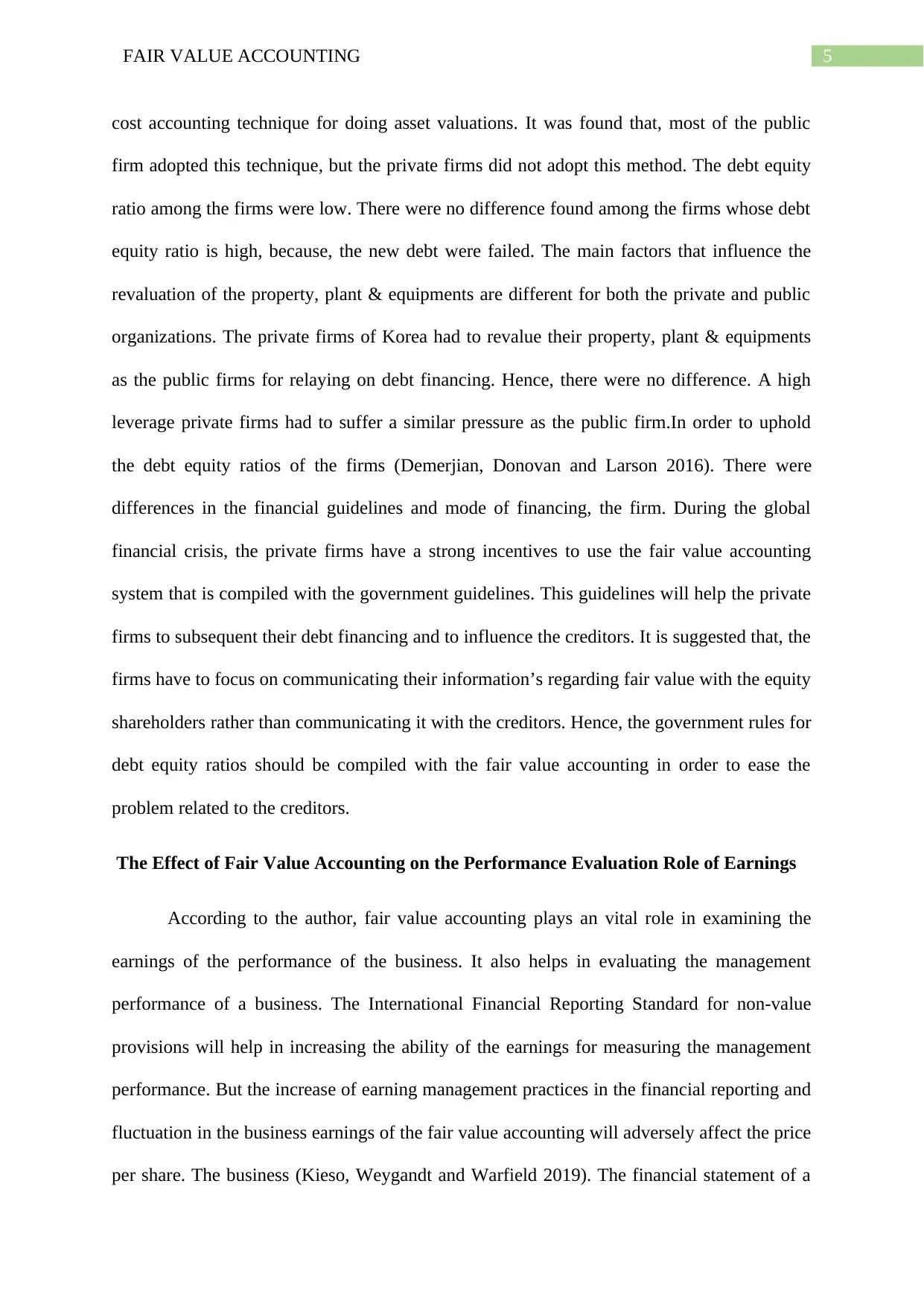
5FAIR VALUE ACCOUNTING
cost accounting technique for doing asset valuations. It was found that, most of the public
firm adopted this technique, but the private firms did not adopt this method. The debt equity
ratio among the firms were low. There were no difference found among the firms whose debt
equity ratio is high, because, the new debt were failed. The main factors that influence the
revaluation of the property, plant & equipments are different for both the private and public
organizations. The private firms of Korea had to revalue their property, plant & equipments
as the public firms for relaying on debt financing. Hence, there were no difference. A high
leverage private firms had to suffer a similar pressure as the public firm.In order to uphold
the debt equity ratios of the firms (Demerjian, Donovan and Larson 2016). There were
differences in the financial guidelines and mode of financing, the firm. During the global
financial crisis, the private firms have a strong incentives to use the fair value accounting
system that is compiled with the government guidelines. This guidelines will help the private
firms to subsequent their debt financing and to influence the creditors. It is suggested that, the
firms have to focus on communicating their information’s regarding fair value with the equity
shareholders rather than communicating it with the creditors. Hence, the government rules for
debt equity ratios should be compiled with the fair value accounting in order to ease the
problem related to the creditors.
The Effect of Fair Value Accounting on the Performance Evaluation Role of Earnings
According to the author, fair value accounting plays an vital role in examining the
earnings of the performance of the business. It also helps in evaluating the management
performance of a business. The International Financial Reporting Standard for non-value
provisions will help in increasing the ability of the earnings for measuring the management
performance. But the increase of earning management practices in the financial reporting and
fluctuation in the business earnings of the fair value accounting will adversely affect the price
per share. The business (Kieso, Weygandt and Warfield 2019). The financial statement of a
cost accounting technique for doing asset valuations. It was found that, most of the public
firm adopted this technique, but the private firms did not adopt this method. The debt equity
ratio among the firms were low. There were no difference found among the firms whose debt
equity ratio is high, because, the new debt were failed. The main factors that influence the
revaluation of the property, plant & equipments are different for both the private and public
organizations. The private firms of Korea had to revalue their property, plant & equipments
as the public firms for relaying on debt financing. Hence, there were no difference. A high
leverage private firms had to suffer a similar pressure as the public firm.In order to uphold
the debt equity ratios of the firms (Demerjian, Donovan and Larson 2016). There were
differences in the financial guidelines and mode of financing, the firm. During the global
financial crisis, the private firms have a strong incentives to use the fair value accounting
system that is compiled with the government guidelines. This guidelines will help the private
firms to subsequent their debt financing and to influence the creditors. It is suggested that, the
firms have to focus on communicating their information’s regarding fair value with the equity
shareholders rather than communicating it with the creditors. Hence, the government rules for
debt equity ratios should be compiled with the fair value accounting in order to ease the
problem related to the creditors.
The Effect of Fair Value Accounting on the Performance Evaluation Role of Earnings
According to the author, fair value accounting plays an vital role in examining the
earnings of the performance of the business. It also helps in evaluating the management
performance of a business. The International Financial Reporting Standard for non-value
provisions will help in increasing the ability of the earnings for measuring the management
performance. But the increase of earning management practices in the financial reporting and
fluctuation in the business earnings of the fair value accounting will adversely affect the price
per share. The business (Kieso, Weygandt and Warfield 2019). The financial statement of a
⊘ This is a preview!⊘
Do you want full access?
Subscribe today to unlock all pages.

Trusted by 1+ million students worldwide
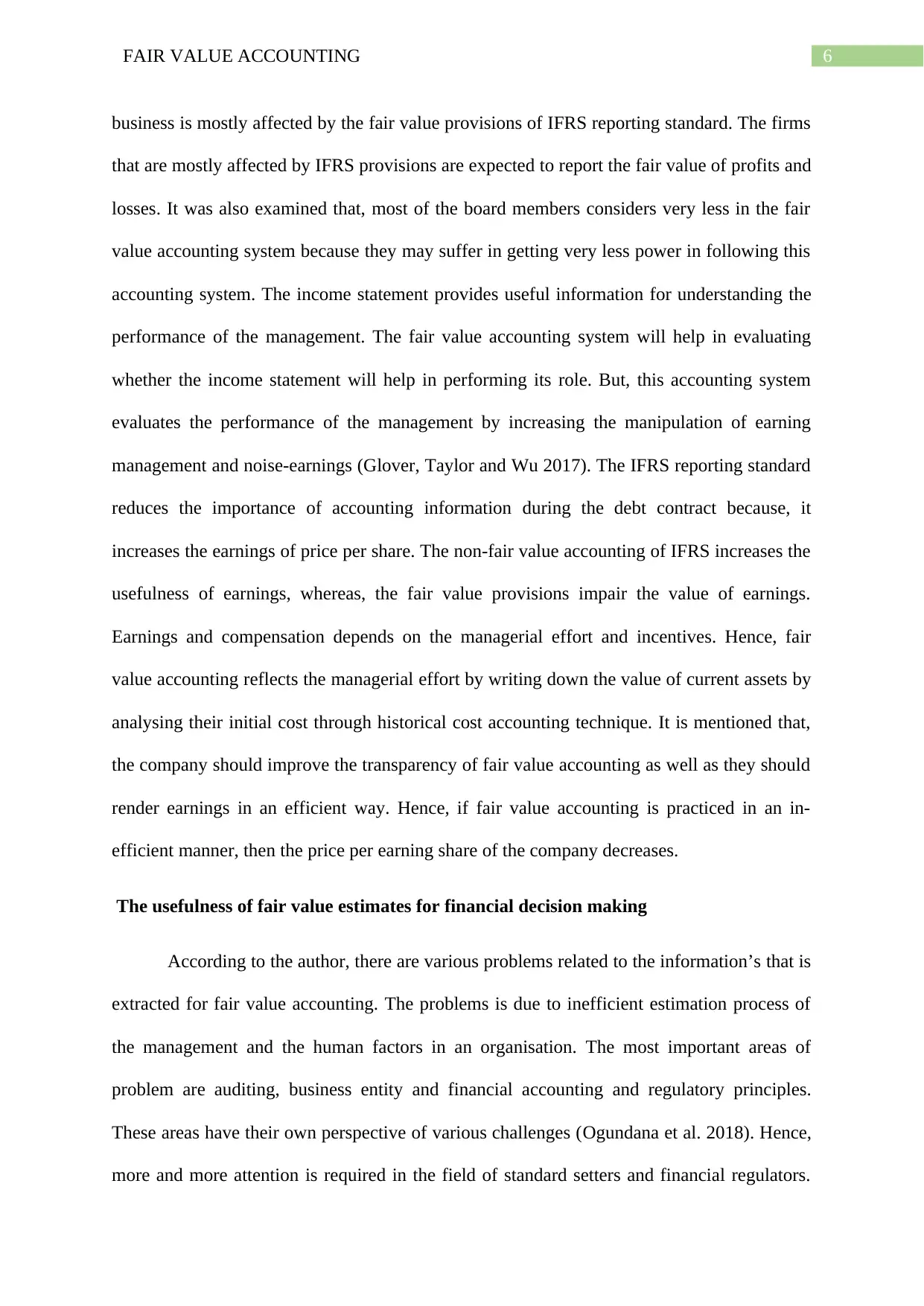
6FAIR VALUE ACCOUNTING
business is mostly affected by the fair value provisions of IFRS reporting standard. The firms
that are mostly affected by IFRS provisions are expected to report the fair value of profits and
losses. It was also examined that, most of the board members considers very less in the fair
value accounting system because they may suffer in getting very less power in following this
accounting system. The income statement provides useful information for understanding the
performance of the management. The fair value accounting system will help in evaluating
whether the income statement will help in performing its role. But, this accounting system
evaluates the performance of the management by increasing the manipulation of earning
management and noise-earnings (Glover, Taylor and Wu 2017). The IFRS reporting standard
reduces the importance of accounting information during the debt contract because, it
increases the earnings of price per share. The non-fair value accounting of IFRS increases the
usefulness of earnings, whereas, the fair value provisions impair the value of earnings.
Earnings and compensation depends on the managerial effort and incentives. Hence, fair
value accounting reflects the managerial effort by writing down the value of current assets by
analysing their initial cost through historical cost accounting technique. It is mentioned that,
the company should improve the transparency of fair value accounting as well as they should
render earnings in an efficient way. Hence, if fair value accounting is practiced in an in-
efficient manner, then the price per earning share of the company decreases.
The usefulness of fair value estimates for financial decision making
According to the author, there are various problems related to the information’s that is
extracted for fair value accounting. The problems is due to inefficient estimation process of
the management and the human factors in an organisation. The most important areas of
problem are auditing, business entity and financial accounting and regulatory principles.
These areas have their own perspective of various challenges (Ogundana et al. 2018). Hence,
more and more attention is required in the field of standard setters and financial regulators.
business is mostly affected by the fair value provisions of IFRS reporting standard. The firms
that are mostly affected by IFRS provisions are expected to report the fair value of profits and
losses. It was also examined that, most of the board members considers very less in the fair
value accounting system because they may suffer in getting very less power in following this
accounting system. The income statement provides useful information for understanding the
performance of the management. The fair value accounting system will help in evaluating
whether the income statement will help in performing its role. But, this accounting system
evaluates the performance of the management by increasing the manipulation of earning
management and noise-earnings (Glover, Taylor and Wu 2017). The IFRS reporting standard
reduces the importance of accounting information during the debt contract because, it
increases the earnings of price per share. The non-fair value accounting of IFRS increases the
usefulness of earnings, whereas, the fair value provisions impair the value of earnings.
Earnings and compensation depends on the managerial effort and incentives. Hence, fair
value accounting reflects the managerial effort by writing down the value of current assets by
analysing their initial cost through historical cost accounting technique. It is mentioned that,
the company should improve the transparency of fair value accounting as well as they should
render earnings in an efficient way. Hence, if fair value accounting is practiced in an in-
efficient manner, then the price per earning share of the company decreases.
The usefulness of fair value estimates for financial decision making
According to the author, there are various problems related to the information’s that is
extracted for fair value accounting. The problems is due to inefficient estimation process of
the management and the human factors in an organisation. The most important areas of
problem are auditing, business entity and financial accounting and regulatory principles.
These areas have their own perspective of various challenges (Ogundana et al. 2018). Hence,
more and more attention is required in the field of standard setters and financial regulators.
Paraphrase This Document
Need a fresh take? Get an instant paraphrase of this document with our AI Paraphraser
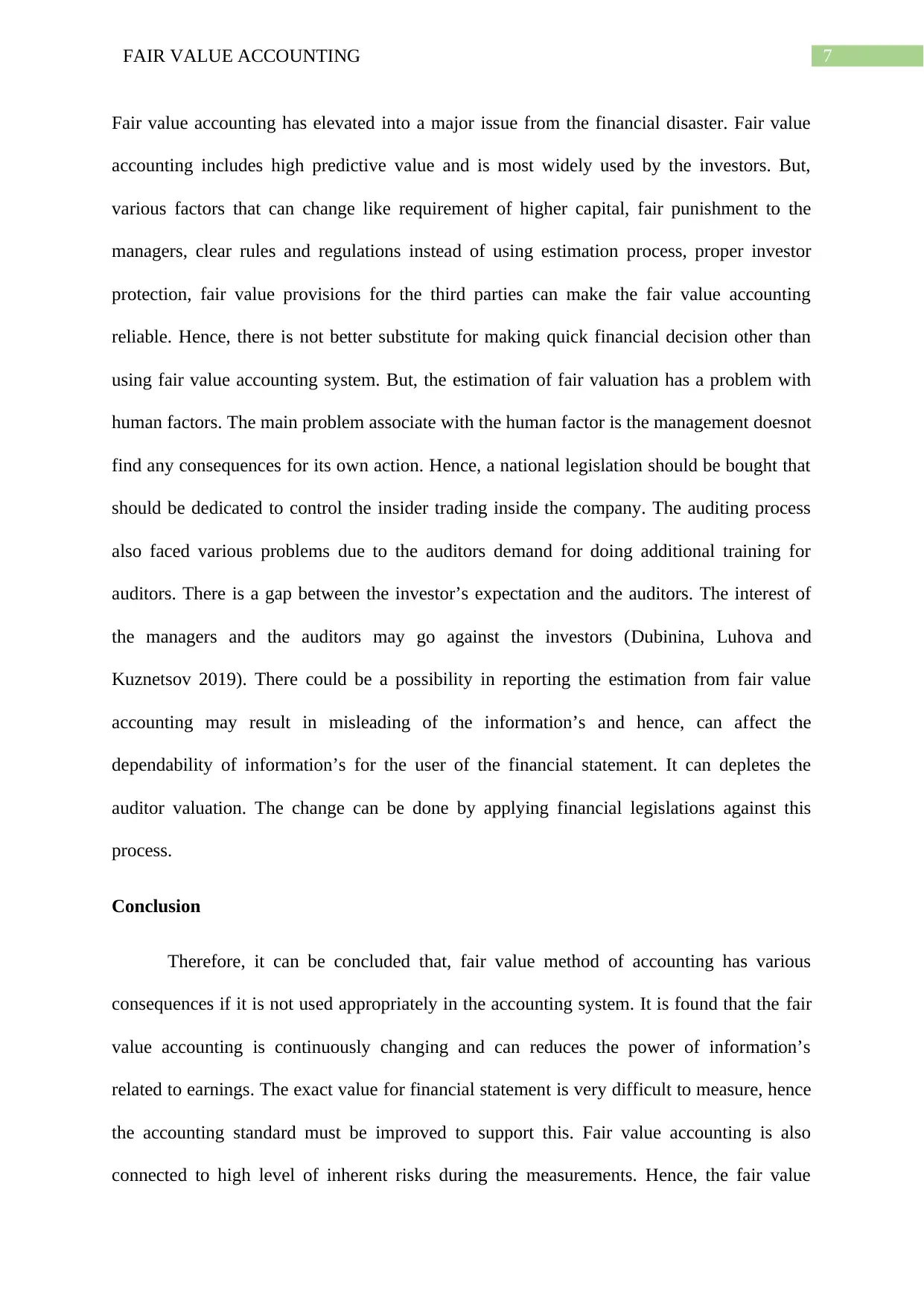
7FAIR VALUE ACCOUNTING
Fair value accounting has elevated into a major issue from the financial disaster. Fair value
accounting includes high predictive value and is most widely used by the investors. But,
various factors that can change like requirement of higher capital, fair punishment to the
managers, clear rules and regulations instead of using estimation process, proper investor
protection, fair value provisions for the third parties can make the fair value accounting
reliable. Hence, there is not better substitute for making quick financial decision other than
using fair value accounting system. But, the estimation of fair valuation has a problem with
human factors. The main problem associate with the human factor is the management doesnot
find any consequences for its own action. Hence, a national legislation should be bought that
should be dedicated to control the insider trading inside the company. The auditing process
also faced various problems due to the auditors demand for doing additional training for
auditors. There is a gap between the investor’s expectation and the auditors. The interest of
the managers and the auditors may go against the investors (Dubinina, Luhova and
Kuznetsov 2019). There could be a possibility in reporting the estimation from fair value
accounting may result in misleading of the information’s and hence, can affect the
dependability of information’s for the user of the financial statement. It can depletes the
auditor valuation. The change can be done by applying financial legislations against this
process.
Conclusion
Therefore, it can be concluded that, fair value method of accounting has various
consequences if it is not used appropriately in the accounting system. It is found that the fair
value accounting is continuously changing and can reduces the power of information’s
related to earnings. The exact value for financial statement is very difficult to measure, hence
the accounting standard must be improved to support this. Fair value accounting is also
connected to high level of inherent risks during the measurements. Hence, the fair value
Fair value accounting has elevated into a major issue from the financial disaster. Fair value
accounting includes high predictive value and is most widely used by the investors. But,
various factors that can change like requirement of higher capital, fair punishment to the
managers, clear rules and regulations instead of using estimation process, proper investor
protection, fair value provisions for the third parties can make the fair value accounting
reliable. Hence, there is not better substitute for making quick financial decision other than
using fair value accounting system. But, the estimation of fair valuation has a problem with
human factors. The main problem associate with the human factor is the management doesnot
find any consequences for its own action. Hence, a national legislation should be bought that
should be dedicated to control the insider trading inside the company. The auditing process
also faced various problems due to the auditors demand for doing additional training for
auditors. There is a gap between the investor’s expectation and the auditors. The interest of
the managers and the auditors may go against the investors (Dubinina, Luhova and
Kuznetsov 2019). There could be a possibility in reporting the estimation from fair value
accounting may result in misleading of the information’s and hence, can affect the
dependability of information’s for the user of the financial statement. It can depletes the
auditor valuation. The change can be done by applying financial legislations against this
process.
Conclusion
Therefore, it can be concluded that, fair value method of accounting has various
consequences if it is not used appropriately in the accounting system. It is found that the fair
value accounting is continuously changing and can reduces the power of information’s
related to earnings. The exact value for financial statement is very difficult to measure, hence
the accounting standard must be improved to support this. Fair value accounting is also
connected to high level of inherent risks during the measurements. Hence, the fair value
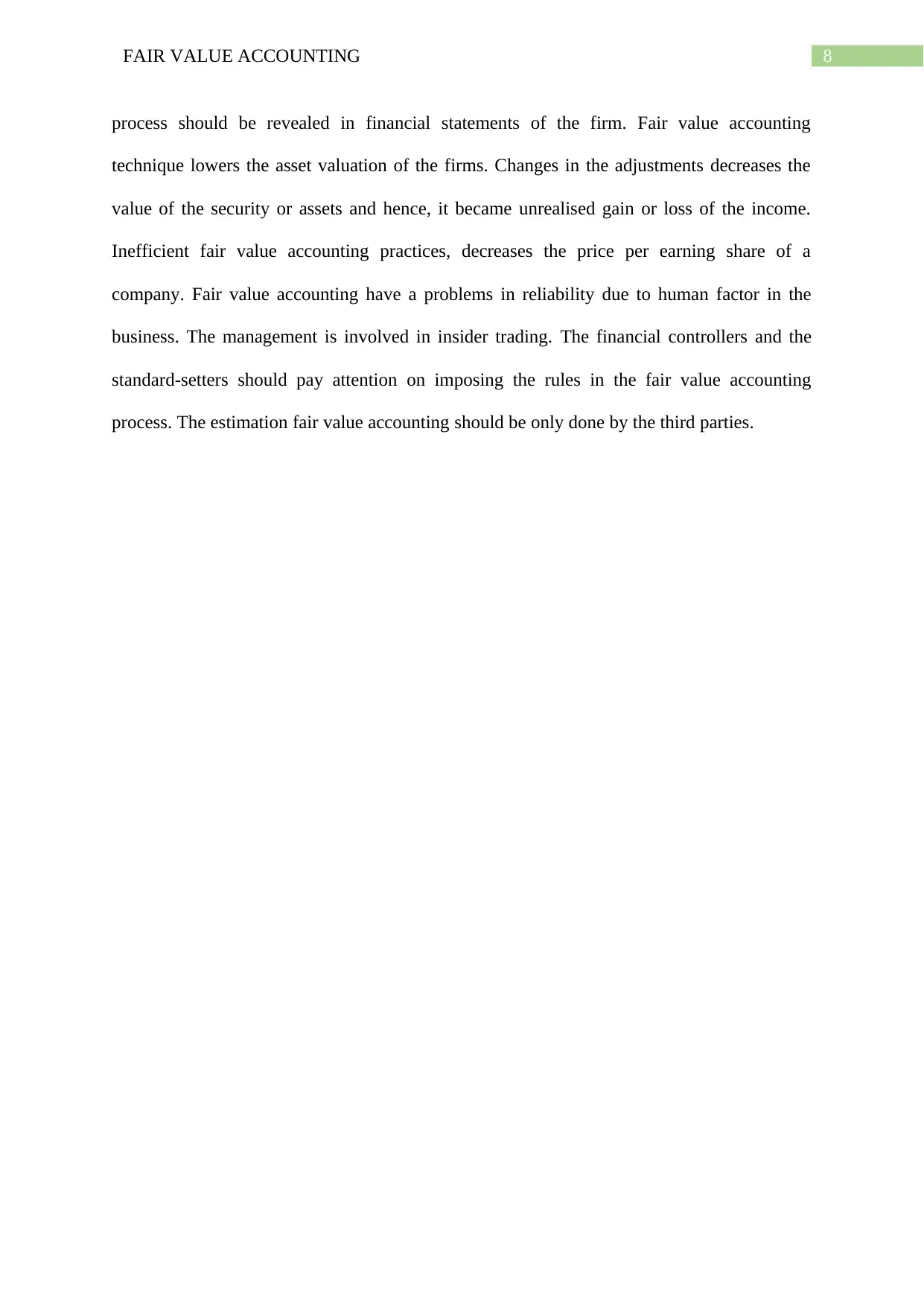
8FAIR VALUE ACCOUNTING
process should be revealed in financial statements of the firm. Fair value accounting
technique lowers the asset valuation of the firms. Changes in the adjustments decreases the
value of the security or assets and hence, it became unrealised gain or loss of the income.
Inefficient fair value accounting practices, decreases the price per earning share of a
company. Fair value accounting have a problems in reliability due to human factor in the
business. The management is involved in insider trading. The financial controllers and the
standard-setters should pay attention on imposing the rules in the fair value accounting
process. The estimation fair value accounting should be only done by the third parties.
process should be revealed in financial statements of the firm. Fair value accounting
technique lowers the asset valuation of the firms. Changes in the adjustments decreases the
value of the security or assets and hence, it became unrealised gain or loss of the income.
Inefficient fair value accounting practices, decreases the price per earning share of a
company. Fair value accounting have a problems in reliability due to human factor in the
business. The management is involved in insider trading. The financial controllers and the
standard-setters should pay attention on imposing the rules in the fair value accounting
process. The estimation fair value accounting should be only done by the third parties.
⊘ This is a preview!⊘
Do you want full access?
Subscribe today to unlock all pages.

Trusted by 1+ million students worldwide
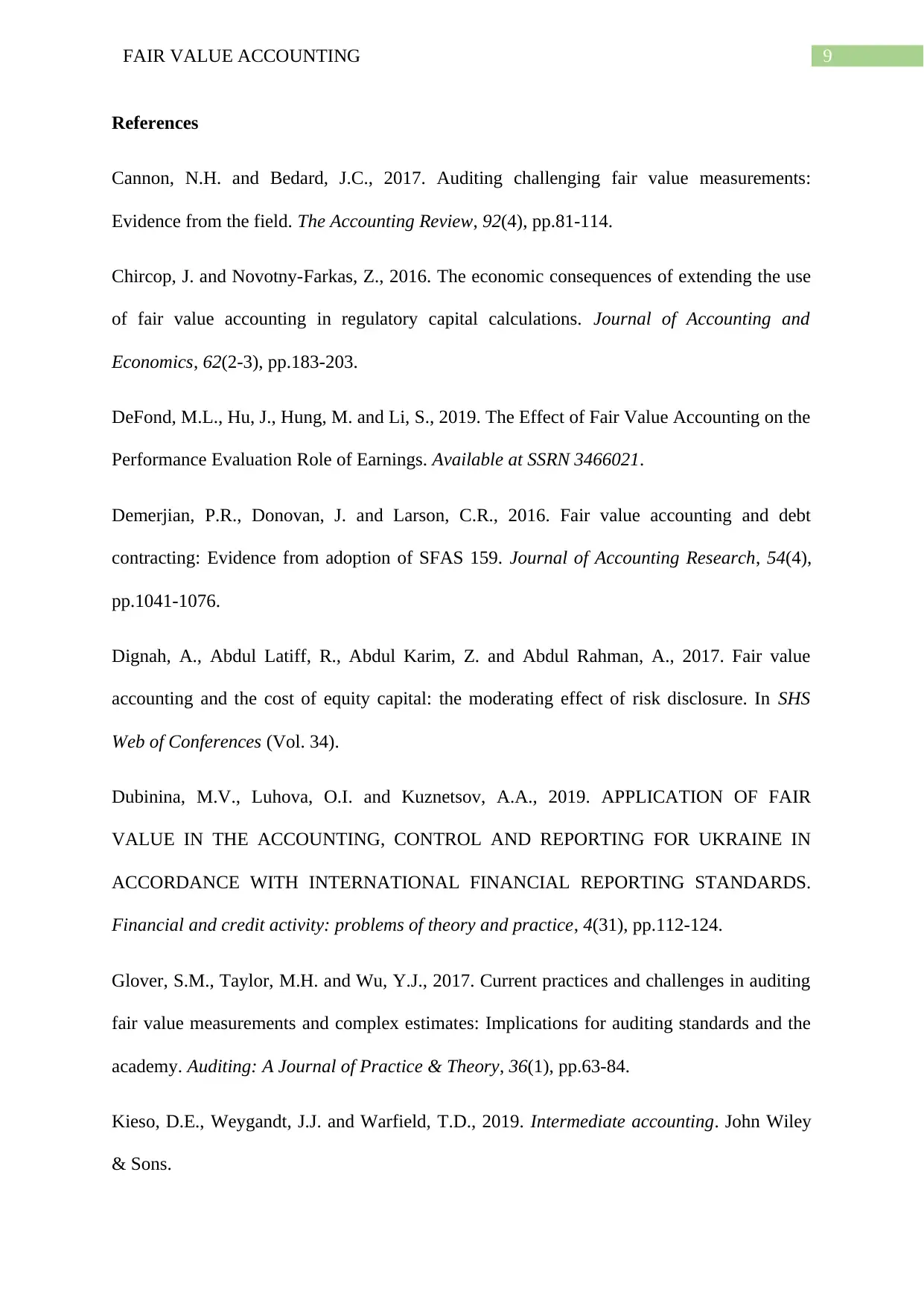
9FAIR VALUE ACCOUNTING
References
Cannon, N.H. and Bedard, J.C., 2017. Auditing challenging fair value measurements:
Evidence from the field. The Accounting Review, 92(4), pp.81-114.
Chircop, J. and Novotny-Farkas, Z., 2016. The economic consequences of extending the use
of fair value accounting in regulatory capital calculations. Journal of Accounting and
Economics, 62(2-3), pp.183-203.
DeFond, M.L., Hu, J., Hung, M. and Li, S., 2019. The Effect of Fair Value Accounting on the
Performance Evaluation Role of Earnings. Available at SSRN 3466021.
Demerjian, P.R., Donovan, J. and Larson, C.R., 2016. Fair value accounting and debt
contracting: Evidence from adoption of SFAS 159. Journal of Accounting Research, 54(4),
pp.1041-1076.
Dignah, A., Abdul Latiff, R., Abdul Karim, Z. and Abdul Rahman, A., 2017. Fair value
accounting and the cost of equity capital: the moderating effect of risk disclosure. In SHS
Web of Conferences (Vol. 34).
Dubinina, M.V., Luhova, O.I. and Kuznetsov, A.A., 2019. APPLICATION OF FAIR
VALUE IN THE ACCOUNTING, CONTROL AND REPORTING FOR UKRAINE IN
ACCORDANCE WITH INTERNATIONAL FINANCIAL REPORTING STANDARDS.
Financial and credit activity: problems of theory and practice, 4(31), pp.112-124.
Glover, S.M., Taylor, M.H. and Wu, Y.J., 2017. Current practices and challenges in auditing
fair value measurements and complex estimates: Implications for auditing standards and the
academy. Auditing: A Journal of Practice & Theory, 36(1), pp.63-84.
Kieso, D.E., Weygandt, J.J. and Warfield, T.D., 2019. Intermediate accounting. John Wiley
& Sons.
References
Cannon, N.H. and Bedard, J.C., 2017. Auditing challenging fair value measurements:
Evidence from the field. The Accounting Review, 92(4), pp.81-114.
Chircop, J. and Novotny-Farkas, Z., 2016. The economic consequences of extending the use
of fair value accounting in regulatory capital calculations. Journal of Accounting and
Economics, 62(2-3), pp.183-203.
DeFond, M.L., Hu, J., Hung, M. and Li, S., 2019. The Effect of Fair Value Accounting on the
Performance Evaluation Role of Earnings. Available at SSRN 3466021.
Demerjian, P.R., Donovan, J. and Larson, C.R., 2016. Fair value accounting and debt
contracting: Evidence from adoption of SFAS 159. Journal of Accounting Research, 54(4),
pp.1041-1076.
Dignah, A., Abdul Latiff, R., Abdul Karim, Z. and Abdul Rahman, A., 2017. Fair value
accounting and the cost of equity capital: the moderating effect of risk disclosure. In SHS
Web of Conferences (Vol. 34).
Dubinina, M.V., Luhova, O.I. and Kuznetsov, A.A., 2019. APPLICATION OF FAIR
VALUE IN THE ACCOUNTING, CONTROL AND REPORTING FOR UKRAINE IN
ACCORDANCE WITH INTERNATIONAL FINANCIAL REPORTING STANDARDS.
Financial and credit activity: problems of theory and practice, 4(31), pp.112-124.
Glover, S.M., Taylor, M.H. and Wu, Y.J., 2017. Current practices and challenges in auditing
fair value measurements and complex estimates: Implications for auditing standards and the
academy. Auditing: A Journal of Practice & Theory, 36(1), pp.63-84.
Kieso, D.E., Weygandt, J.J. and Warfield, T.D., 2019. Intermediate accounting. John Wiley
& Sons.
Paraphrase This Document
Need a fresh take? Get an instant paraphrase of this document with our AI Paraphraser
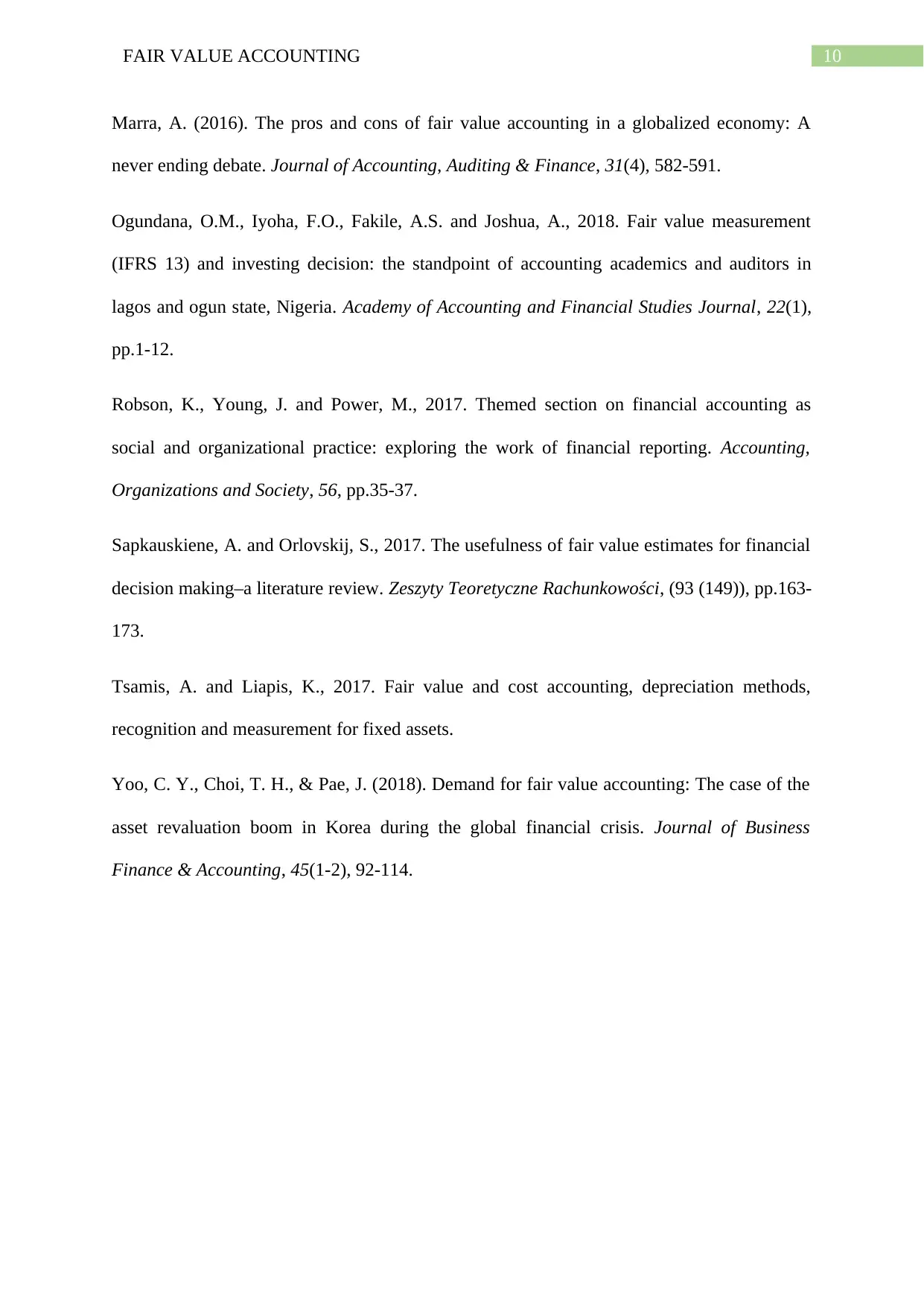
10FAIR VALUE ACCOUNTING
Marra, A. (2016). The pros and cons of fair value accounting in a globalized economy: A
never ending debate. Journal of Accounting, Auditing & Finance, 31(4), 582-591.
Ogundana, O.M., Iyoha, F.O., Fakile, A.S. and Joshua, A., 2018. Fair value measurement
(IFRS 13) and investing decision: the standpoint of accounting academics and auditors in
lagos and ogun state, Nigeria. Academy of Accounting and Financial Studies Journal, 22(1),
pp.1-12.
Robson, K., Young, J. and Power, M., 2017. Themed section on financial accounting as
social and organizational practice: exploring the work of financial reporting. Accounting,
Organizations and Society, 56, pp.35-37.
Sapkauskiene, A. and Orlovskij, S., 2017. The usefulness of fair value estimates for financial
decision making–a literature review. Zeszyty Teoretyczne Rachunkowości, (93 (149)), pp.163-
173.
Tsamis, A. and Liapis, K., 2017. Fair value and cost accounting, depreciation methods,
recognition and measurement for fixed assets.
Yoo, C. Y., Choi, T. H., & Pae, J. (2018). Demand for fair value accounting: The case of the
asset revaluation boom in Korea during the global financial crisis. Journal of Business
Finance & Accounting, 45(1-2), 92-114.
Marra, A. (2016). The pros and cons of fair value accounting in a globalized economy: A
never ending debate. Journal of Accounting, Auditing & Finance, 31(4), 582-591.
Ogundana, O.M., Iyoha, F.O., Fakile, A.S. and Joshua, A., 2018. Fair value measurement
(IFRS 13) and investing decision: the standpoint of accounting academics and auditors in
lagos and ogun state, Nigeria. Academy of Accounting and Financial Studies Journal, 22(1),
pp.1-12.
Robson, K., Young, J. and Power, M., 2017. Themed section on financial accounting as
social and organizational practice: exploring the work of financial reporting. Accounting,
Organizations and Society, 56, pp.35-37.
Sapkauskiene, A. and Orlovskij, S., 2017. The usefulness of fair value estimates for financial
decision making–a literature review. Zeszyty Teoretyczne Rachunkowości, (93 (149)), pp.163-
173.
Tsamis, A. and Liapis, K., 2017. Fair value and cost accounting, depreciation methods,
recognition and measurement for fixed assets.
Yoo, C. Y., Choi, T. H., & Pae, J. (2018). Demand for fair value accounting: The case of the
asset revaluation boom in Korea during the global financial crisis. Journal of Business
Finance & Accounting, 45(1-2), 92-114.
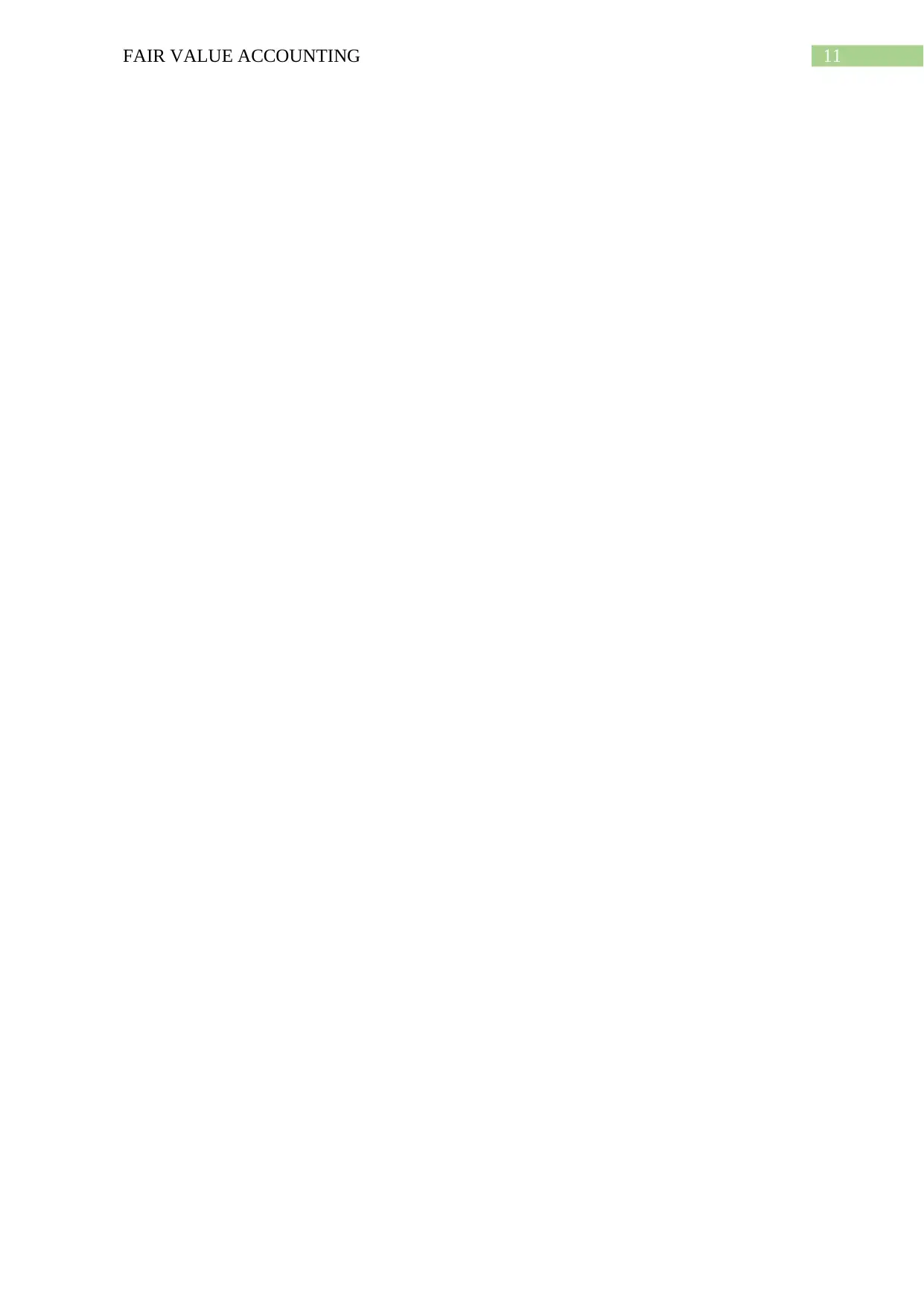
11FAIR VALUE ACCOUNTING
⊘ This is a preview!⊘
Do you want full access?
Subscribe today to unlock all pages.

Trusted by 1+ million students worldwide
1 out of 12
Related Documents
Your All-in-One AI-Powered Toolkit for Academic Success.
+13062052269
info@desklib.com
Available 24*7 on WhatsApp / Email
![[object Object]](/_next/static/media/star-bottom.7253800d.svg)
Unlock your academic potential
Copyright © 2020–2026 A2Z Services. All Rights Reserved. Developed and managed by ZUCOL.





